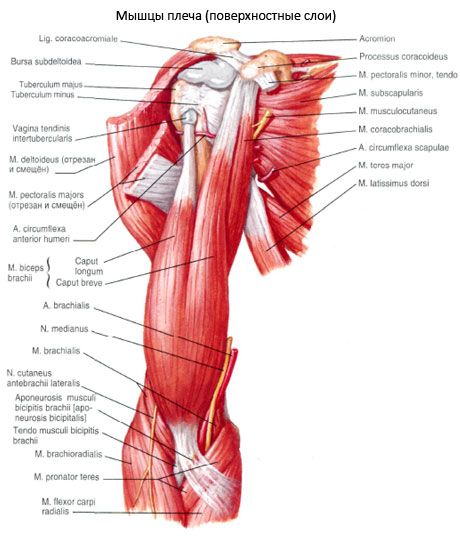Biceps brachii (biceps brachii)
Last reviewed: 31.05.2018

All iLive content is medically reviewed or fact checked to ensure as much factual accuracy as possible.
We have strict sourcing guidelines and only link to reputable media sites, academic research institutions and, whenever possible, medically peer reviewed studies. Note that the numbers in parentheses ([1], [2], etc.) are clickable links to these studies.
If you feel that any of our content is inaccurate, out-of-date, or otherwise questionable, please select it and press Ctrl + Enter.
The biceps brachii muscle has two heads - short and long.
The short head (caput breve) originates together with the coracobrachialis muscle at the apex of the coracoid process of the scapula. The long head (caput longum) originates on the supraglenoid tubercle of the scapula with a long tendon that pierces the capsule of the shoulder joint from top to bottom (being covered inside the joint cavity by the synovial membrane) and exits onto the shoulder, where it lies in the intertubercular groove.
At the level of the middle of the shoulder, both heads join into a common belly of a spindle-shaped form, which passes into a tendon attached to the tuberosity of the radius. From the anteromedial surface of the tendon, a well-defined fibrous plate separates - the aponeurosis of the biceps brachii (aponeurosus m.bicipitis brachii), the bundles of which pass downwards and are medially woven into the fascia of the forearm.

Function of the biceps brachii (biceps brachii): flexes the shoulder at the shoulder joint; flexes the forearm at the elbow joint; rotates the inwardly rotated forearm outward (supination).
Innervation of the biceps brachii muscle (biceps brachii): musculocutaneous nerve (CV-CVIII).
Blood supply of the biceps brachii muscle (biceps brachii): brachial artery, superior and inferior collateral ulnar arteries, recurrent radial artery.
